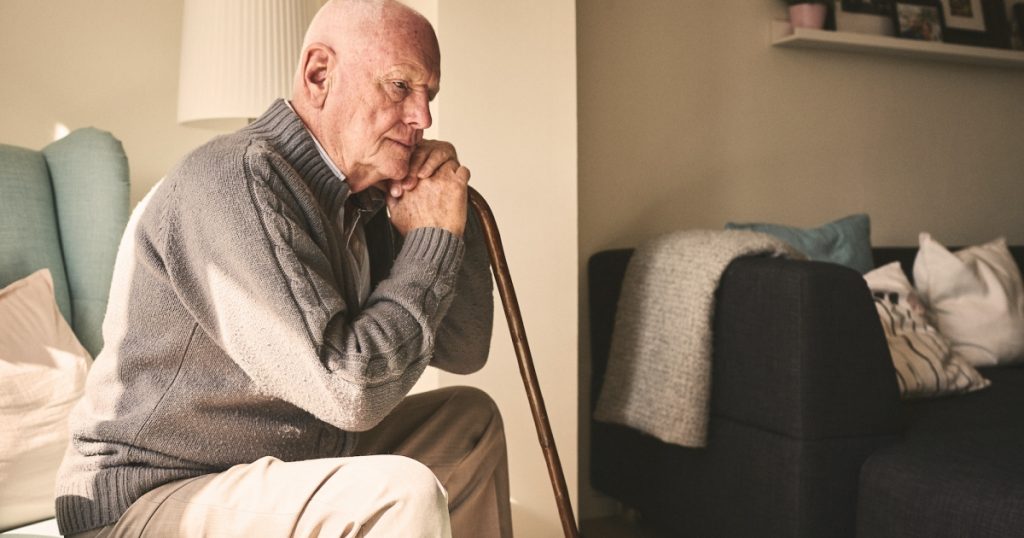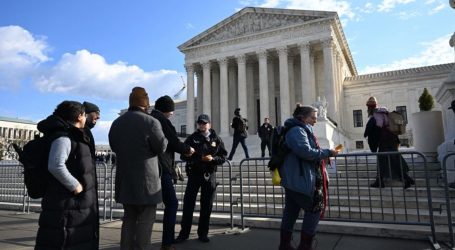SCOTUS Just Upheld the Civil Rights of Millions of Disabled and Aging People
Dean Mitchell/Getty
Fight disinformation: Sign up for the free Mother Jones Daily newsletter and follow the news that matters.On Thursday, the Supreme Court issued a landmark 7-2 ruling affecting millions of aging and disabled people: Providers of federally funded health services like Medicaid or Medicare, the court ruled—such as public and private nursing homes—can be sued by individuals for failures and lapses in care.
Following the death of 85-year-old Gorgi “Jorgo” Talevski in October 2021, his surviving family members sued the state-run Health and Hospital Corporation of Marion County, Indiana, alleging that Talevski’s nursing home gave him psychotropic drugs as restraints and attempted to involuntarily discharge him to a facility for people with dementia. Talevski’s family claimed that his treatment violated restrictions on chemical restraints and patient discharge set by the Federal Nursing Home Reform Act, 1987 legislation that “establishes the minimum standards of care” for Medicaid-backed nursing homes, according to the Kaiser Family Foundation. Oral arguments were heard in November.
This week, the court found in favor of the Talevski estate, upholding a decision by the Seventh Circuit Court of Appeals with Justices Clarence Thomas and Samuel Alito dissenting. A lower court had found that private citizens had no standing to sue. Given the conservative makeup of the court, a ruling in Talevski’s favor wasn’t certain: instead of guaranteeing key protections, the justices could have gutted the civil rights of disabled and aging people.
But the legislation “unambiguously” grants individual rights, Justice Ketanji Brown Jackson wrote in the majority opinion, including the “right to be free from unnecessary chemical restraints”—those “imposed for purposes of discipline or convenience” and not medically required—and “to be discharged or transferred only when certain preconditions are met.” Patients and their families, Health and Hospital Corp had argued, weren’t entitled to enforce those rights.
“We have no doubt,” Jackson wrote, “that HHC wishes [Section] 1983 said something else.”
Kathy Flaherty, executive director of the Connecticut Legal Rights Project, which serves low-income people who have psychiatric disabilities, found it concerning that the nursing home ignored a judge’s order in its treatment of Talevski.
“It was only with the intervention of an outside neurologist that his medications were reduced and he began to regain the ability to feed himself,” Flaherty said. “The nursing home sent him to inpatient psychiatric facilities far away from his family and then refused to readmit him.”
The Talevski family’s case is a victory for disability and aging communities, and covers some 150 million recipients of either Medicare or Medicaid, the United States’ public health insurance program for people who are low-income. Disabled people are twice as likely to live in poverty as non-disabled people, according to federal data. Doron Dorfman, a professor at Seton Hall Law School, said the decision was important in part due to historical mistreatment of people in these communities.
“Considering the history of abuse of people with disabilities and old people in institutions, and the more recent incidents of COVID deaths in understaffed nursing homes, having the Supreme Court affirm a legal recourse under federal law is incredibly significant,” Dorfman said.
The right of disabled people to live outside institutions was also determined by the court in its 1999 Olmstead v. L.C. ruling (Thomas also dissented in that case). Centers for independent living, for example, have helped disabled people remain in their communities and still receive the services they want.
“It means that those historically underserved communities can sue programs receiving government funding, said Dorfman, “in situations when their rights are violated.”
Whether or not aging people identify as being disabled or having disabilities, the treatment of people with some age-associated chronic health conditions is protected under disability rights legislation. Historically, disabled people have filed complaints about discrimination under the Americans with Disabilities Act.
Shira Wakschlag, legal director of the Arc, which advocates for the rights of people with intellectual and developmental disabilities, said the decision affirms for disabled people “the long-standing precedent about the ability to seek relief in court when your rights are violated.”
However, as highlighted by Boston University health law professor Nicole Huberfeld on Twitter, Thomas’s dissent points to potentially more troubling positions—as the justice wants the Supreme Court to “revisit its understanding of spending power.”
Thomas’s Talevski dissent is alarming: he would undo the spending power, basically – which would spell the end programs like Medicare & Medicaid. His position has become more radical on the spending power over time. #Medicaid pic.twitter.com/ycnqqylC4I
— Nicole Huberfeld (@nhuberfeld1) June 8, 2023
“Today,” Talevski’s daughter, Susie, said at a press conference following the decision, “the Supreme Court came in on the side of…the little guys.”




